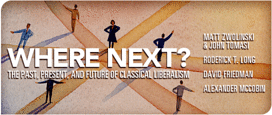My thanks also, to Cato and to my interlocutors. I want to close by emphasizing three points.
First: although, as Matt and John rightly stress, a conception of justice that is insensitive to issues of human welfare is no morality for human beings, it’s also true that a conception of human welfare that is insensitive to issues of justice is likewise no morality for human beings. That is why I find the approaches of Bentham and of Rawls similarly problematic: they both treat the content of human welfare as something given, something that can be defined independently of moral considerations. In this they indeed follow the dominant trend of post-Renaissance moral philosophy, in both its consequentialist and deontological incarnations: while (rightly) viewing morality as something requiring complex analysis, such approaches treat happiness as something fairly obvious, and in any case something whose nature can be presupposed before turning to moral issues. A richer and more promising picture of value is indicated by the eudaimonist tradition of thinkers like Plato, Aristotle, Cicero, and Aquinas, who saw the concept of happiness as no less complex than, and as inherently entangled with, that of justice. The sensitivity of justice to welfare needs to be a two-way street here, and to the extent that this is recognised, the drift toward excessive consequentialism is averted.
Second: in its relative inattention to what Nozick called “historical” and I would call “causal” or “agential” issues, the Rawlsian approach neglects the fertile field of class analysis. Once we realise that the inequalities that beset contemporary capitalist society are not merely inefficiencies in the system, but on the contrary are the result of systematic expropriation and exploitation of the less affluent (and less politically connected) by the more so, both the right-wing temptation to dismiss distributional concerns as driven by “envy” and the left-wing temptation to seek to redress such problems via appeal to the very state instrumentalities that produce and perpetuate them will be more effectively forestalled.
Third: there is a widespread tendency, both on the part of the opponents of bleeding-heart libertarianism and on the part of many of its adherents, to think that the increased sensitivity to the welfare of the poor advocated by BHL naturally leads to a less radical or less “absolutist” version of libertarianism, one more open to exceptions or even to state action. That this is not so is evident from the examples of Thomas Hodgskin, Herbert Spencer, Gustave de Molinari, Benjamin Tucker, and Lysander Spooner in the 19th century; Karl Hess, Sam Konkin, and 1960s-version Rothbard in the 20th; or Kevin Carson, Gary Chartier, Sheldon Richman, and Charles Johnson today. Once the virtually inevitable role of the state as a tool of plutocratic interests is recognised, the effect of social-justice considerations on libertarianism is less to blunt its radicalism than to egg it on.
So that’s my prescription for libertarianism’s “where next?”: Aristotle, agora, anarchy, action!

